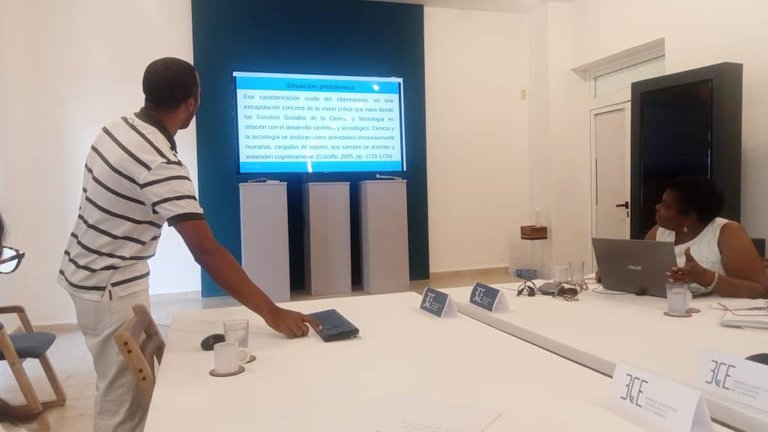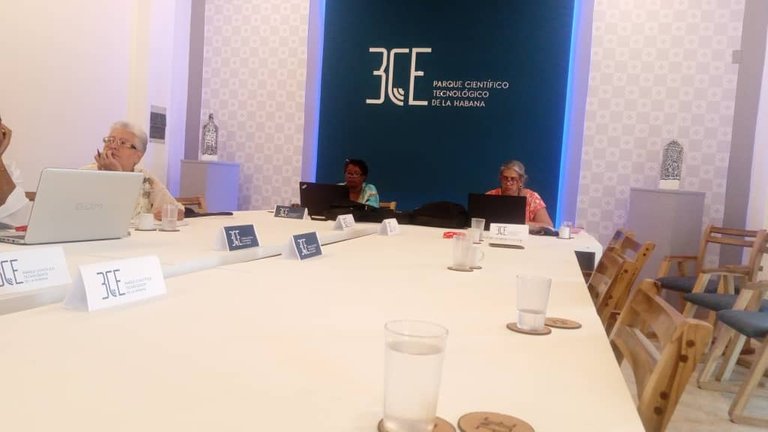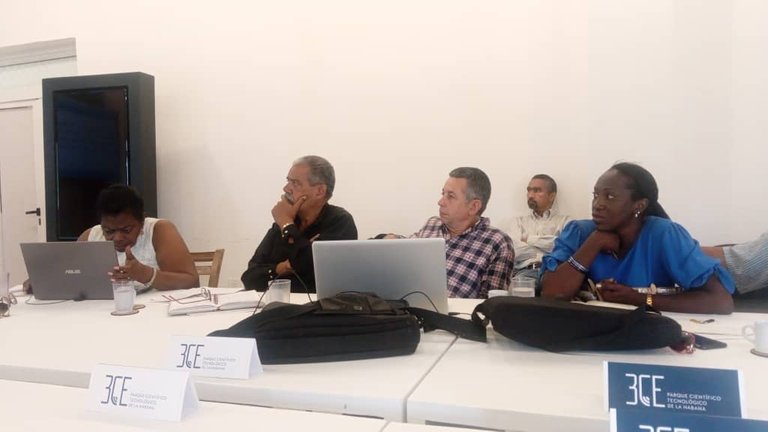Diviértete y aprende [ES-EN]

"Cuban researchers meeting" / Deep Dream Generator
Hola hivers. He estado unos días fuera de circulación, sin prestarle atención a una iniciativa propia en la comunidad Deep Dives —que pretendo empujar hasta que se establezca—, y también con poca actividad en Threads, ese maravilloso proyecto de LeoFinance para interactuar entre todos en Hive. No pasa nada, a veces no podemos escapar tan fácil de las obligaciones laborales, familiares y de otro tipo, porque son muy urgentes y decisivas, o porque, precisamente por dedicarle tiempo a la creación de contenido en la blockchain, se te han acumulado.
Esta semana ha sido de las más ajetreadas en lo que va de año. Además de la atención a la familia, mis tareas docentes (el paquete básico), y un proyecto de promoción en el que participo a instancias de mis grandes amigas de LyM Social, también me correspondía discutir los avances de mi investigación doctoral en un taller con el dificilísimo —porque no se le va una— pero súper profesional y cariñoso comité académico que dirige el Doctorado en Estudios Sociales de la Ciencia y la Tecnología de la Universidad de Cienfuegos.
Obviamente no es objetivo aquí discutir diseños teóricos ni nada que se le parezca —lo reservo para otro post en la comunidad apropiada—, pero sí compartir algunas ideas sobre este tipo de ejercicios de superación en el orden científico.
Investigar como una actividad lúdica
Parto de que hacerse Doctor en Ciencias en Cuba es algo que solo sirve para esa persona que se divierte primero cuando investiga, y luego cuando comparte sus resultados con pares dentro del ámbito científico o la sociedad en general. Es el único modo en el que sobre todo hoy, en medio de una crisis que no te permite casi respirar, alguien aquí puede aventurarse en este camino, donde tendrás que dedicar mucho tiempo y esfuerzo, someterte a rigurosos ejercicios de discusión, publicar resultados, mantener en orden tus responsabilidades clásicas, y todo eso sabiendo desde el principio que hacer el grado no repercutirá significativamente en tu bolsillo (ojalá esto se arregle pronto).
A mí me motiva navegar la literatura científica de los temas que me interesan. En este sentido soy harto selectivo: me muevo entre los textos clásicos o fundacionales del campo de estudios que esté trabajando, y aquellos que son bien recientes, recuperados por registros de publicaciones científicas de alto impacto. Hay dos servicios que te salvarán la vida para siempre si eres un investigador en Cuba: LibGen (otra interfaz aquí) y Sci-Hub.
 |  |
|---|
LibGen es más general y contiene referencias al segundo. Se trata de un gigantesco catálogo con descripciones y categorías asociadas a recursos como libros y artículos científicos publicados en una extensa red que se le vincula (se dice que es la más grande biblioteca libre de la historia). Mucha de la literatura disponible allí es de pago, de primera clase, y aunque ello tiene sus conflictos éticos, para nosotros esta dimensión es totalmente secundaria por razones bien conocidas. Pero lo más interesante es su brutal nivel de actualidad: allí encontrarás —simbólicamente hablando— el libro que se publicará mañana.
En lo atinente a Sci-Hub, el propio sitio declara que se trata de un proyecto controversial (otra vez por razones legales, cuestionamientos éticos, etc.), pero cuyo objetivo es proveer acceso libre y sin restricciones a todo el conocimiento científico publicado en cualquier época en libros o revistas. Si te encuentras algún artículo que te interese y se te resista porque no lo puedes pagar o simplemente no tienes acceso, y cuentas con su DOI, lo único que necesitas es pasarle esta referencia a Sci-Hub y la magia (casi siempre) se hace. Así, al amparo de estos dos servicios, lograrás que las referencias bibliográficas le aporten valor a tu trabajo. Y cuando no consigo lo que quiero allí —que es muy poco la verdad—, entonces apelo a esta comunidad en Reddit.
La mejor parte de todo esto es cuando encuentras que algún peso pesado en la literatura valida una propuesta que tengas, o te da luz verde para desarrollarla. Esa sensación es magnífica, de lo más parecido a un orgasmo en la actividad científica, y trabajando mi diseño teórico recientemente la pude experimentar otra vez. Lo mismo me pasa cuando se me mete en la cabeza llegar al fondo de un asunto, encontrar una información, un dato que se me hace esquivo (deuda que si no saldo no me permite avanzar), y finalmente puedo gritar ¡eureka!
Ante el sanedrín
Bueno, dije arriba que compartir tus resultados de investigación ante pares es algo divertido, pero no siempre. Lo es si vas preparado, pero he sido vapuleado con mucha razón cuando he sido finalista y me he presentado con proyectos inacabados o apresurados. Y si vas a trabajar un tema polémico —cosa que pone a los tribunales en alerta máxima— como el primero por el que aposté en mi tesis de maestría, debes ir preparado con un arsenal teórico muy fuerte que te permita resistir todos los martillazos que intentarán asestarte.
Pero no es el caso de las experiencias que voy teniendo en este doctorado, sobre todo la de ayer, en la cual la valoración del comité académico sobre mi presentación hizo que olvidara las madrugadas sin dormir. Miren, estos ejercicios académicos son muy útiles, enriquecedores, y —repito que cuando no tienes nada que temer— felices. Ayudan a que uno gane en seguridad, a defender tu criterio sobre bases sólidas, a ser receptivo ante la crítica, a respetar el criterio del otro, abrirse a nuevas perspectivas, entre otras bondades. Llevar esto de la academia a la práctica social siempre es valor agregado.
Asimismo disfruto, me alienta y enorgullece como cubano ver el altísimo nivel científico alcanzado por los profesionales que nos guían. Pero además me place mucho ver que todos estamos alegres allí. El conocimiento que circula pesa como si fuera oro, nos hace sentir inmensamente ricos y a todo el mundo se le olvida su pequeño o gran problema.

 |  |  |
|---|
Comentario final
Los procesos de investigación y superación científica generan bienestar para quienes participan de ellos. Hoy se gradúa un amigo y colega que se la ha pasado bomba con su tema. Tuve un estudiante que abandonó la universidad por razones personales, está trabajando en el sector privado, y regresó en la modalidad de curso por encuentros a graduarse como ingeniero porque se lo debía a sí mismo, según me dijo (me tocó ser oponente de su tesis).
De mi parte tengo el compromiso de entregar el primer capítulo de mi memoria escrita para la próxima sesión presencial en mayo, y el comité me ordenó que fuera rápido con ese encargo. Yo la verdad que había activado el botón pause durante unos meses, porque uno también se relaja y se toma su descanso, pero ya estoy súper activado y motivado para continuar este alegre y créanme que desinteresado reto que es hacerse doctor en Cuba. Feliz jornada de jueves.
Have fun and learn (English version)
Hi, hivers. I've been a few days out of circulation, without paying attention to an initiative of my own in the Deep Dives community —which I intend to push until it is established—, and also with little activity in Threads, that wonderful project of LeoFinance people to interact with each other in Hive. That's okay, sometimes we can't escape so easily from work, family, and other obligations, because they are very urgent and decisive, or because, precisely because of devoting time to creating content here, they have piled up on us.
This week has been one of the busiest so far this year. In addition to family care, my teaching duties (the basic package), and a promotion project in which I participate at the behest of my great friends at LyM Social, I also had to discuss the progress of my doctoral research in a workshop with the very difficult —because they don't miss one error— but the super professional and affectionate academic committee that runs the Ph.D. in Social Studies of Science and Technology (Science and Technology Studies or Science, Technology, and Society in American or Europe approaches) at the University of Cienfuegos.
The objective here is not to discuss theoretical designs or anything similar —I reserve that for another post in the appropriate community—, but to share some ideas on this type of exercise of improvement in the scientific order.
Research as a playful activity
I start from the assumption that becoming a Doctor of Science in Cuba is something that only works for that person who has fun first when doing research, and then when sharing his or her results with peers within the scientific field or society in general. It's the only way that especially today, in the midst of a crisis that doesn't allow you to almost breathe, someone here can venture on this path, where you will have to devote much time and effort, undergo rigorous discussion exercises, publish results, keep in order your classic responsibilities, and all that knowing from the beginning that reaching the grade will not significantly impact on your pocket (hopefully this will be fixed soon).
I'm naturally motivated to browse scientific literature on the topics that interest me. In this sense I'm very selective: I move between the classic or foundational texts of the field of study I currently work and those that are very recently retrieved from high-impact scientific publication records (WoS or Scopus, for example). Two services will save your life forever if you are a researcher in Cuba: LibGen (another interface here) and Sci-Hub.
 |  |
|---|
LibGen is more general and contains references to the latter. It is a gigantic catalog with descriptions and categories associated with resources such as books and scientific articles published in an extensive network that links to it (it is said to be the largest free library in history). Much of the literature available there is paid-for, first-class, and while that has its ethical conflicts, for us this dimension is entirely secondary for well-known reasons. But what is most interesting is its brutal level of topicality: there you will find —symbolically speaking— the book that will be published tomorrow.
Regarding Sci-Hub, the site itself declares that it is a controversial project (again for legal reasons, ethical questions, etc.), but whose objective is to provide unrestricted access to all scientific knowledge published at any time in books or journals. If you find an article that interests you and you can't afford it or simply don't have access to it, and you have its DOI, all you need to do is pass this reference to Sci-Hub and the magic (almost always) is done. Thus, under the protection of these two services, you will achieve that bibliographic references add value to your work. And when I don't get what I want there —which is very little indeed—, then I appeal to this community on Reddit.
The best part of all this is when you find that some heavyweight in the literature validates your proposal or gives you the green light to develop it. That feeling is magnificent, the closest thing to an orgasm in scientific activity, and working on my theoretical design recently I was able to experience it again. The same thing happens to me when I get it into my head to get to the bottom of an issue, find a piece of information, a piece of data that is elusive to me (a debt that if I don't get out of it I won't be able to move forward), and finally, I can shout eureka!
Before the Sanhedrin
Well, I said above that sharing your research results in front of peers is fun, but not always. It is if you are prepared, but I have been rightly slammed when I have been a finalist and presented with unfinished or rushed projects. And if you are going to work on a controversial topic —something that puts the courts on high alerts— like the first one I bet on in my master's thesis, you must be prepared with a powerful theoretical arsenal that will allow you to resist all the hammer blows they will try to deal you.
But this is not the case with the experiences I'm having in this doctorate, especially yesterday, in which the academic committee's evaluation of my presentation made me forget the sleepless nights. Look, these kinds of exercises are very useful, enriching, and —I repeat when you have nothing to fear— happy. They help you to gain confidence, defend your criteria on a solid basis, be receptive to criticism, respect the outside criteria, to open up to new perspectives, among other benefits. Taking this from academia to social practice in general. It is always an added value.
I also enjoy, am encouraged, and proud as a Cuban to see the high scientific level reached by the professionals who guide us. But I am also delighted to see that we are all happy there. The knowledge that circulates weighs as if it were gold, it makes us feel immensely rich and everyone forgets their small or big problem.

 |  |  |
|---|
Final comment
The processes of research and scientific improvement generate well-being for those who participate in them. Today a friend and colleague who has had a great time with his subject is graduating. I had a student who left the university for personal reasons, is working in the private sector, and returned in the modality of course by meetings to graduate as an engineer because he owed it to himself, as he told me (I had to be the opponent of his thesis).
On my part, I have the commitment to deliver the first chapter of my written memory for the next face-to-face session in May, and the committee ordered me to be quick with that assignment. The truth is that I had activated the pause mode for a few months because one also relaxes and takes a break, but I am now super activated and motivated to continue this joyful and selfless challenge that is to become a doctor in science in Cuba. Happy Thursday.
Research is really great especially when you have a great team you work with.
Goodluck also wurt Deep Dives 👍
Thanks always for your strong support and kind feedback bro. I feel very good so far with my work via Deep Dives, and I'm sure it will rock much more with time. Best regards from the island.
You're welcome
Eres un inspirador. Siempre regresarás y te estaremos esperando 💥
Mejor digamos que nunca me voy 😉.
✌️
Congratulations @limonta! You have completed the following achievement on the Hive blockchain And have been rewarded with New badge(s)
Your next target is to reach 400 comments.
You can view your badges on your board and compare yourself to others in the Ranking
If you no longer want to receive notifications, reply to this comment with the word
STOPTo support your work, I also upvoted your post!
Check out our last posts:
Yay! 🤗
Your content has been boosted with Ecency Points, by @limonta.
Use Ecency daily to boost your growth on platform!
Support Ecency
Vote for new Proposal
Delegate HP and earn more
Thanks for supporting my work. I have voted your new proposal because of how important I see the work that Ecency advances. Best regards.
Thank you for your support, it is a great help for this project. It is greatly appreciated.
Muchas gracias por el decisivo apoyo a mi trabajo acá. Saludos desde Cuba.
Hola qué alentador leer tu post, yo también soy profesora universitaria y ando en las cuestiones urgentes del doctorado afinando el diseño y las tareas colaterales del plan de formación doctoral. Así que es muy bueno sabes que otros profesionales se debaten también entre la familia, el trabajo y el mundo digital y aún así les queda tiempo para investigar. Le sigo y le leo con atención.
Hola colega, un enorme placer recibir su retroalimentación. Me alegra saberla de igual modo involucrada en estos menesteres, que siempre constituyen un aporte. Por acá tuvimos a una compañera de ustedes, no recuerdo bien si del área económica, que está integrada ahora a este programa que comento de la Universidad de Cienfuegos. También la sigo desde ya, la leeré en retrospectiva, y estaré atento a sus próximas contribuciones por acá. Saludos cordiales.
Gracias por ser tan atento. Estuvimos optando por el doctorado allá en Cienfuegos porque la comisión nacional de carrera de Gestión Sociocultural para el Desarrollo está allá. Pero fue muy difícil en tiempo de pandemia y ahora el transporte no facilita la movilidad así que reorienté mi tema a Ciencias de la Educación.
Su post ha sido valorado por @ramonycajal